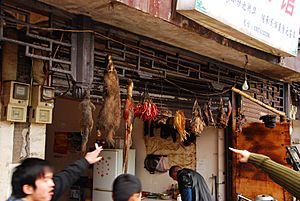Yewei facts for kids
Quick facts for kids Yewei |
|||||||||||
|---|---|---|---|---|---|---|---|---|---|---|---|

Ye wei in Hunan
|
|||||||||||
| Chinese | 野味 | ||||||||||
| Literal meaning | wild taste | ||||||||||
|
|||||||||||
Yewei (pronounced "yeh-way") is a Chinese term. It describes different kinds of wild animal meat. This includes meat from wild animals that are not usually eaten. It's like saying "wild taste" in English.
Contents
What does "Yewei" mean?
The Chinese word "野" (yě) means "wild". It comes from a longer phrase meaning "wild beasts". The word "味" (wèi) means "taste". It also refers to special foods that many people enjoy. So, "Yewei" means "wild taste" or "wild delicacy".
A Look at History
For a long time, important people in Chinese history ate special wild animals. They would ask for grand animals for their meals. A famous example is the Manchu–Han Imperial Feast. Today, anyone who can get wild animals might eat yewei. These animals can also be brought in from other places.
Animals Eaten as Yewei
Many different animals can be part of yewei. These include:
- badgers
- bats
- beavers
- civets
- crocodiles
- foxes
- giant salamanders
- hedgehogs
- marmots
- ostriches
- otters
- pangolins
- peacocks
- pheasants
- porcupines
- rabbits
- rats
- snakes (like the many-banded krait)
- spotted deer
- turtles
- wolf pups
Cultural Views on Yewei
Not many people in China actually eat wild animals. However, there are different opinions about whether it should be eaten. A survey in 2006 found that about 70% of people in 16 Chinese cities had not eaten wild animals. This was a big increase from a similar survey in 1999. Another survey in 2014 showed that over half of the people agreed that wild animals should not be eaten.
Some people in Southern China used to joke that they would "eat anything with four legs except a table." After the SARS epidemic in the early 2000s, eating unusual wild animals became very unpopular. This was especially true in Guangdong. Later, when COVID-19 started, the Chinese government made it illegal to trade and eat wild animals. Many people in China also wanted a permanent ban on this practice.
See also
 In Spanish: Ye wei para niños
In Spanish: Ye wei para niños
 | Isaac Myers |
 | D. Hamilton Jackson |
 | A. Philip Randolph |

